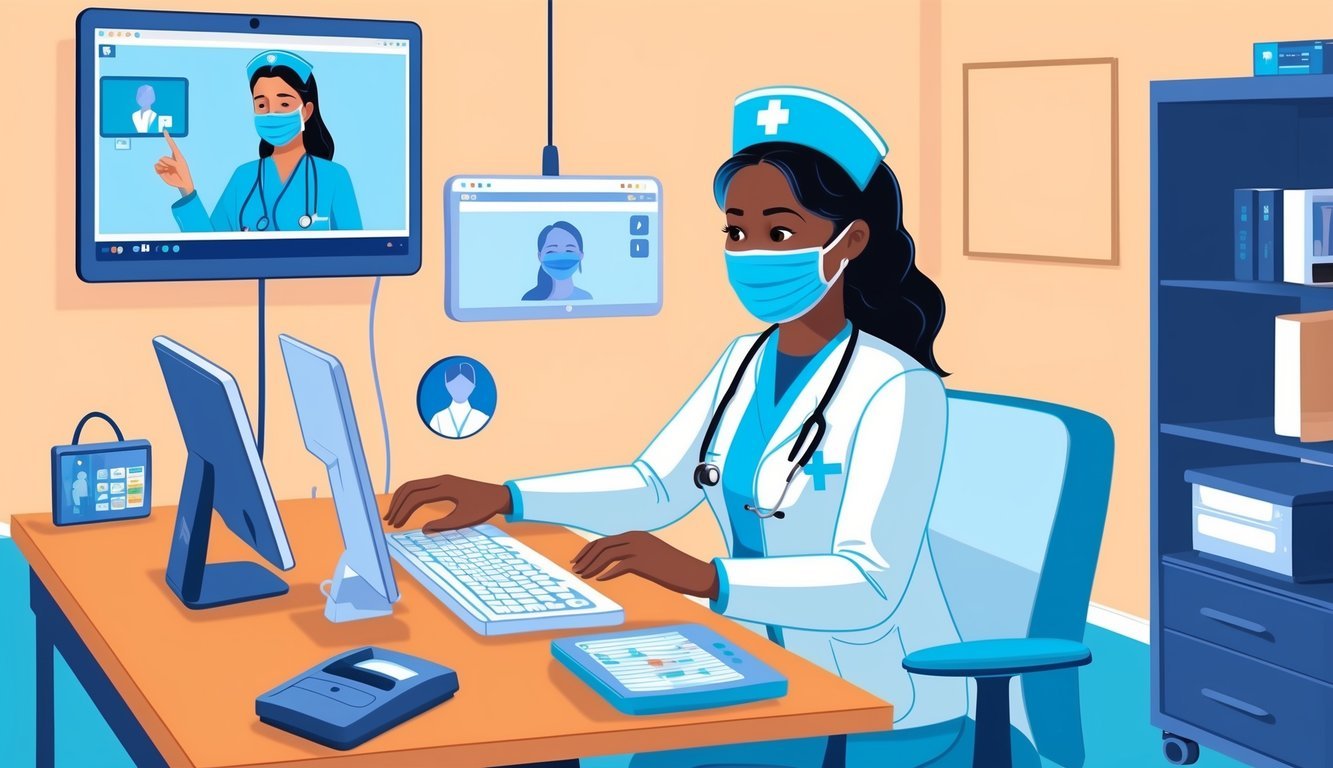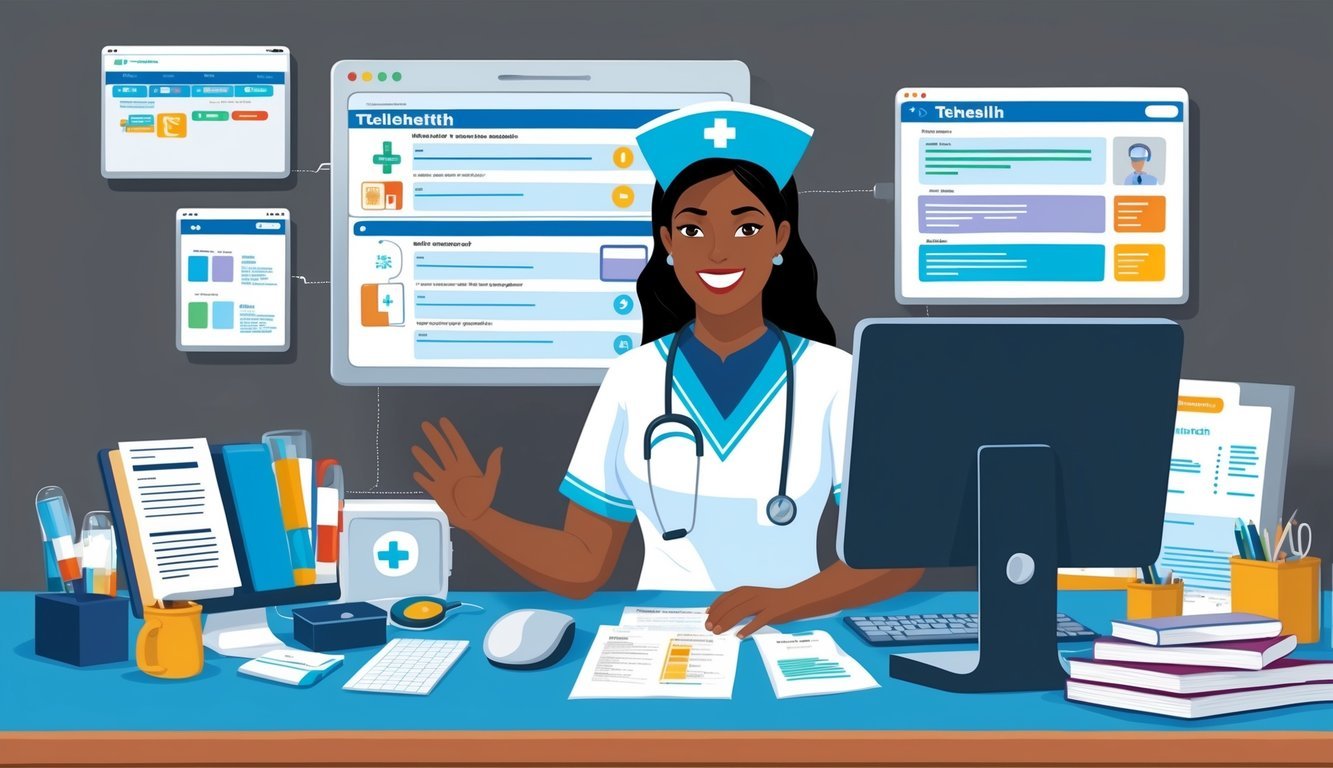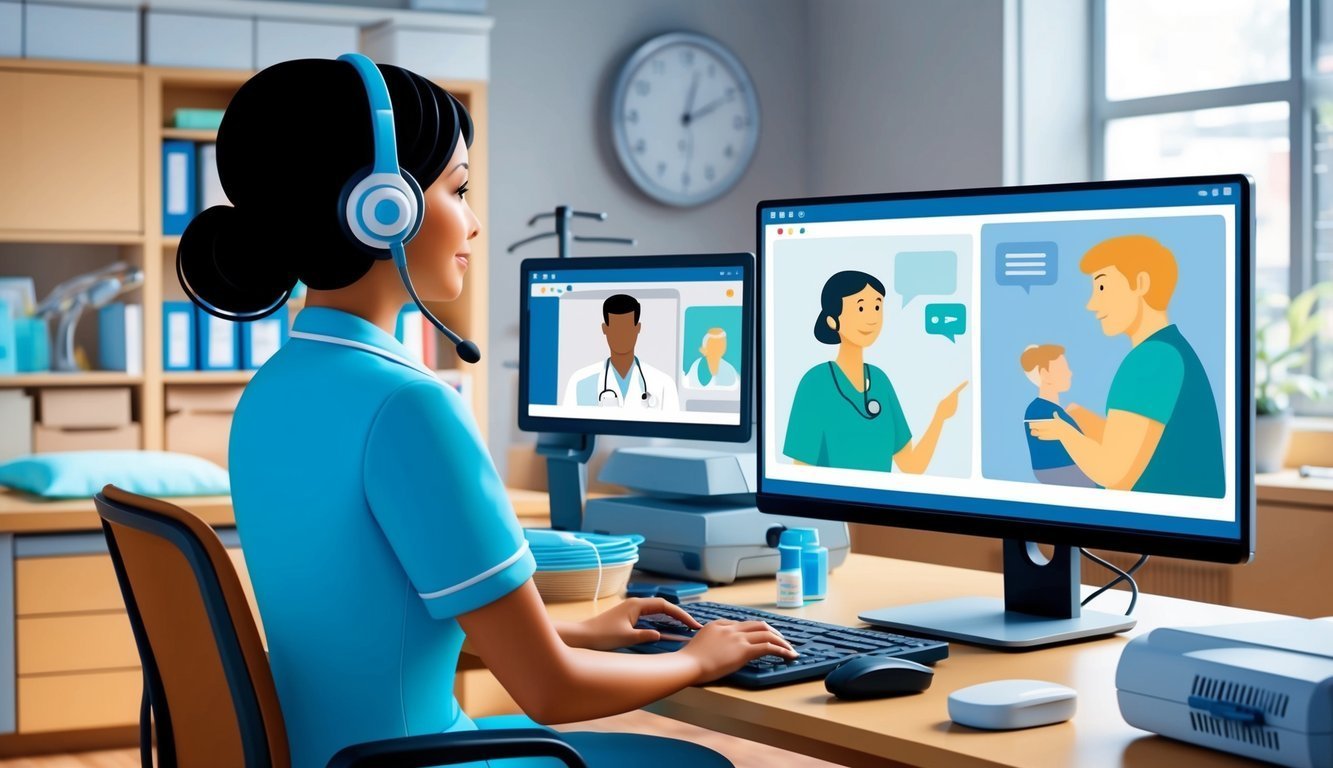Telehealth nursing is a growing field that allows registered nurses to provide care from a distance using technology.
If you want to become a telehealth nurse, you need to complete nursing school, gain practical experience, and embrace technology.
With the increase in remote healthcare, many opportunities are available, making this a promising career choice for nurses.
This role blends traditional nursing with the latest technology, giving you the chance to impact patients’ lives while enjoying the benefits of flexible working conditions.
As you cultivate your skills in telehealth, you’ll also stay on the cutting edge of healthcare innovation.
Whether you seek to enhance your nursing career or discover new ways to serve patients, telehealth nursing is an exciting option worth exploring.
Key Takeaways
- Completing a nursing degree is essential to become a telehealth nurse.
- Clinical experience and technology skills are critical for success in this field.
- Telehealth nursing offers flexible career opportunities in a rapidly growing sector.
Understanding Telehealth Nursing
Telehealth nursing is a growing field that utilizes technology to deliver health care services remotely.
This approach allows nurses to provide care to patients without the need for in-person visits.
Key components of telehealth nursing include virtual visits, remote monitoring, and the use of digital health technologies.
What Is Telehealth Nursing?
Telehealth nursing involves providing health care services through digital means.
It connects patients and healthcare providers using technology like video calls and mobile apps.
This method can include various services such as virtual visits, where patients consult nurses from home.
Nurses in this field can guide patients on managing chronic conditions, answer health questions, and provide education about treatments.
They may also use remote monitoring tools to track patients’ health metrics, ensuring timely interventions when necessary.
The Expansion of Telehealth Services
The demand for telehealth services has surged, especially since the pandemic.
Many health systems have adopted telemedicine to reach patients who cannot visit hospitals.
This approach improves access to care, particularly for those in rural or underserved areas.
Mobile health applications have also played a key role in this expansion, allowing for continuous communication between patients and providers.
With advancements in digital health technologies, telehealth is becoming more efficient and effective, leading to better patient outcomes.
Telehealth nursing continues to grow as a vital aspect of modern health care.
You can explore more about telehealth nursing here.
Educational Pathways to Becoming a Telehealth Nurse

To become a telehealth nurse, you need a solid educational foundation.
You will follow several key steps, including obtaining a nursing degree, passing the required licensure exam, and possibly pursuing advanced certifications or degrees.
Necessary Educational Background
Your first step is to complete a nursing program.
This can be either an Associate Degree in Nursing (ADN) or a Bachelor of Science in Nursing (BSN).
Many positions prefer candidates with a BSN due to its broader training and education.
BSN programs typically cover subjects like chemistry, biology, and nursing theory.
They also provide clinical experiences that are crucial for real-world care.
If you’re considering a quicker route, an Accelerated BSN program can transform your previous degree into a nursing qualification in about a year.
You can find BSN programs at various universities and online nursing degree options that offer flexibility.
After finishing your degree, you’ll be prepared for the next steps in your telehealth nursing career.
Licensure: NCLEX-RN Examination
After completing your nursing degree, you must pass the National Council Licensure Examination for Registered Nurses (NCLEX-RN).
This exam tests your knowledge and competency in nursing.
To register for the NCLEX-RN, you’ll need to apply through your state’s nursing board, often requiring proof of your degree.
Proper preparation is essential, as passing this exam is mandatory for obtaining your RN licensure.
Once you pass the NCLEX-RN, you will receive your RN license, allowing you to work as a licensed RN.
Keeping up with continuing education requirements is also important to maintain your license and stay current in the field.
Advanced Degrees and Specializations
To stand out as a telehealth nurse, you may choose to pursue further education or certifications.
Specializing through Ambulatory Care Nursing Certification can enhance your qualifications.
This certification is not mandatory but can provide a competitive edge.
Many RNs opt for a Master of Science in Nursing (MSN) to gain advanced skills in telehealth and other specializations.
This degree often opens doors to leadership and management positions within healthcare organizations.
If you’re interested in a more focused practice, look into specific telehealth training programs.
Additionally, some employers may offer internal training to help you adapt to telehealth technologies and best practices.
Gaining Clinical Experience and Specialized Knowledge
To succeed as a telehealth nurse, you need a blend of clinical experience and specialized knowledge.
These components help ensure that you can provide effective patient care remotely.
The following sections highlight key areas to focus on in your nursing career.
Clinical Requirements for Telehealth Nurses
As a telehealth nurse, certain clinical requirements must be met.
First, you need to earn a nursing degree, either an Associate Degree in Nursing (ADN) or a Bachelor of Science in Nursing (BSN).
After completing your degree, obtaining your Registered Nurse (RN) license is essential.
Many telehealth positions also require at least one to four years of bedside nursing experience.
This experience builds your ability to assess patient needs, develop care plans, and communicate effectively.
Familiarity with medical devices and technology used in telehealth, such as video conferencing tools and electronic health records, is also critical for your success.
Bedside Experience and Patient Care Skills
Having bedside experience is vital for telehealth nurses.
It equips you with practical patient care skills.
You should be comfortable performing assessments, managing medications, and understanding patient conditions.
During your bedside experience, focus on building these essential skills:
- Communication: Develop the ability to convey complex information clearly to patients.
- Empathy: Cultivating empathy helps you connect with patients, even from a distance.
- Critical Thinking: You must quickly analyze patient data to make informed decisions about care.
This hands-on experience is invaluable when transitioning to virtual care environments.
Role of Continuing Education
Continuing education is important for telehealth nurses.
The healthcare field is always evolving, especially in technology and patient care practices.
You should consider pursuing additional certifications in telenursing or specialized areas of nursing.
These certifications enhance your credibility and show your commitment to excellence.
Many organizations offer online courses and workshops tailored to telehealth nursing.
These learning opportunities keep you updated on the latest trends, technology, and regulations within the industry.
Engaging in lifelong learning not only improves your skills but also increases your marketability in a competitive field.
Technological Proficiency in Telehealth Nursing
In telehealth nursing, mastery of specific technologies is essential.
This includes understanding telecommunications technologies and managing remote patient monitoring systems.
Your communication skills also play a vital role in effectively using these tools to provide quality care.
Understanding Telecommunications Technologies
Telecommunications technologies form the backbone of telehealth nursing.
You will need to become familiar with various platforms that facilitate virtual consultations.
These can include:
- Video Conferencing Tools: Tools like Zoom or Skype enable face-to-face interactions with patients.
- Healthcare Apps: Many mobile applications allow for easy patient check-ins and communication.
Being proficient with these technologies means you can efficiently assess patients’ health while gathering essential data.
This skill can enhance patient experiences and outcomes.
Remote Patient Monitoring and Data Management
Remote patient monitoring (RPM) involves tracking patients’ health outside of conventional clinical settings.
You will use devices that monitor vital signs like heart rate, blood pressure, and glucose levels.
This data is collected in real-time and transmitted securely to healthcare providers.
Key elements of RPM include:
| Device Type | Purpose |
|---|---|
| Wearable Monitors | Track physical activity, heart rate |
| Smart Blood Pressure Cuffs | Monitor hypertension |
| Glucometers | Measure blood sugar levels |
Understanding how to manage and interpret this data is crucial.
It enables you to make informed decisions and provide timely interventions when necessary.
Effective communication with patients about their data can also improve adherence to care plans.
Career Advancement and Opportunities in Telehealth
As a telehealth nurse, you can find numerous opportunities for career growth.
The telehealth job market is expanding, providing a variety of roles.
Increased certifications and specializations can enhance your skills and salary potential.
Understanding the salary range and job outlook is crucial for planning your career path.
Navigating the Telehealth Job Market
The telehealth job market is continuously growing, driven by the demand for remote healthcare services.
Many healthcare facilities and organizations are hiring telehealth nurses to provide patient care, monitor chronic conditions, and manage cases.
Key roles include:
- Telehealth Coordinator: Manages telehealth programs.
- Patient Care Triage Nurse: Assesses patient needs remotely.
- Case Manager: Coordinates care for patients, focusing on chronic conditions.
Job match platforms can help you find suitable positions based on your skills and experience.
Keep an eye on job postings in major healthcare providers and telehealth companies.
Certification and Specializations
Obtaining telehealth certification can set you apart in the job market.
Certifications demonstrate your expertise in remote patient care and related technologies.
Consider certifications such as:
- Telehealth Nursing Certification (TNCC)
- Certified Case Manager (CCM)
These certifications not only validate your skills but may also lead to higher salaries and more job opportunities.
Specialized training in areas like behavioral health or chronic disease management can further enhance your qualifications.
Understanding the Telehealth Nurse Salary
The salary for a telehealth nurse can vary based on experience, specialization, and location.
According to the U.S. Bureau of Labor Statistics, registered nurses earn a median annual wage of $73,300, but telehealth nurses often earn more due to their specialized skills.
Here’s a brief salary overview:
| Position | Average Salary |
|---|---|
| Telehealth Nurse | $75,000 – $90,000 |
| Case Manager | $80,000 – $100,000 |
| Nurse Practitioner in Telehealth | $95,000 – $115,000 |
Additionally, the job outlook for telehealth nursing remains strong, with many healthcare providers expanding their telehealth options.
Staying updated with new technologies and practices will help you succeed in this evolving field.
Frequently Asked Questions

This section addresses common questions about becoming a telehealth nurse.
You will find specific information regarding qualifications, certification, job transitions, salary expectations, job searches, and challenges faced in telehealth nursing.
What qualifications are necessary to become a telehealth nurse practitioner?
To become a telehealth nurse, you typically need a Bachelor of Science in Nursing (BSN) or an Associate Degree in Nursing (ADN).
After completing your degree, you must pass the National Council Licensure Examination (NCLEX-RN) to become a licensed registered nurse.
Additional training in telehealth practices can be beneficial.
What are the certification requirements for a telehealth nurse?
While you may not need a specific telehealth certification, it is recommended to pursue certifications such as the Certified Telehealth Nurse (CTN).
Obtaining this certification can show your expertise in managing telehealth services and enhance your job prospects.
How can a registered nurse transition to a telehealth nursing role?
You can transition to telehealth by gaining experience in a clinical setting first.
Familiarize yourself with telehealth technology and best practices.
Many employers offer training for new telehealth nurses, allowing you to learn on the job.
What are the salary expectations for a telehealth nurse in the United States?
Telehealth nurses can expect competitive salaries.
The median annual salary for registered nurses in the U.S. is about $73,300, while telehealth nurses often earn above this average, depending on experience and location.
The highest-paid nurses can exceed $111,200 annually.
How does one find telehealth nursing jobs, particularly remote positions?
To find telehealth nursing jobs, you can search online job boards and healthcare-specific websites.
Networking with healthcare professionals and joining telehealth associations can also provide job leads.
Many remote positions are available due to the increasing demand for telehealth services.
What challenges are commonly faced by nurses in telehealth, and how can they be managed?
Telehealth nurses may face challenges such as technology issues, patient engagement, and ensuring privacy.
To manage these challenges, you should stay updated on telehealth tools, enhance your communication skills, and understand privacy regulations to maintain patient confidentiality.

